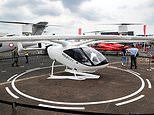
The bags are packed, the alarm is set, and it’s not long until you can throw on that new bikini or pair of trunks and jump into the hotel pool.
But first you’ve got to get there and that often means a tedious journey of queues and grumpy officials, so the only thing you’re ready to dive into when you arrive, is a bed.
Well, not for much longer it seems. Airports, airlines, and hotels have sought out scientists to speed up every step in the process – from the latest AI advancements to Jetsons-like flying taxis.
This month, the Daily Mail visited technology expo GITEX Global in Dubai to learn how those who can’t wait for a holiday to start could soon get there faster.
Clear passport control in seconds without stopping
Say goodbye to waiting at passport control for stony-faced officials to stamp your ID. Even those clunky e-gates will soon be old hat. Now at one airport you can simply stroll through without showing your documents – or even having to stop.
Dubai International Airport has introduced an AI-powered passenger corridor, where cameras – housed in pillars on either side – scan passengers’ faces as they walk through and check them against pre-registered biometric data.
‘There are no barriers,’ says an Emirates representative, who explains that ten people can go through in just 14 seconds. Any anomalies are flagged to security officials who can intervene – but you won’t see them until then, he adds.
Say goodbye to waiting at passport control for stony-faced officials to stamp your ID. Even those clunky e-gates will soon be old hat. Now at one airport you can simply stroll through without showing your documents – or even having to stop
Launched last spring, the service is currently only available for business and first-class passengers who depart from Terminal 3, but it’s expected to continue expanding across the airport.
Keep everything in your pockets at scanners
Security queues are often the biggest bottleneck – and the most faff. First, you’ve got to dig out everything in your pockets and put it in a tray. Then you have to stand awkwardly, arms aloft and feet spread, as the body scanner checks you’re all clear.
Now, however, scientists at MIT in the US have come up with a way to do away with both. Called Hexwave, the new body scanners are able to create an instant 3D image of a person – and then use AI to detect whether any object on them is a threat or benign. If a prohibited item is detected, the system flags it to staff who can intercept the passenger. Several US airports are trialling the technology to check passengers and staff.
Passengers tracked ‘from kerb to gate’
Running late for a flight and see the board flashing ‘final call’? Soon, you won’t have to worry the plane might leave without you. New ‘digital twin’ technology – essentially a 3D virtual model of the airport in real-time – can now track every passenger from the moment they check-in to when they finally board the plane.
‘If a passenger isn’t on their flight, you can see exactly where they are stuck and help them,’ says Bashar Dbissi, senior manager at Dubai International Airport, which is testing the technology in Terminal 2. Each passenger is tagged with a unique identifier on arrival and then monitored by sensors throughout their journey to the gate.
Officials hope to roll it out across the airport by the end of the year. Several other airports – including Sydney, Vancouver and Amsterdam Schiphol – are also developing the tech.
New ‘digital twin’ technology – essentially a 3D virtual model of the airport in real-time – can now track every passenger from the moment they check-in to when they finally board the plane
Take an air taxi to the hotel
You’ve finally arrived and look to jump in a cab… only to find it’s rush hour and the roads are gridlocked. Fear not, by next year you may be able to skip the traffic completely and jump in a flying taxi instead. US firm Joby Aviation has designed an electric vehicle (left) that can whisk passengers at 200mph from the airport to their hotels in minutes.
Using six propellers to take off and land vertically, it is able to carry four passengers at a time and, because it’s electric, sounds no louder than a conversation. Joby – which is looking to launch in the UK, US, UAE, Japan and South Korea – is aiming to make the flights cost no more than a regular Uber.
In Dubai, where it is closest to becoming a reality as soon as next year, it takes only 12 minutes from the airport to Palm Jumeirah, compared to 45 minutes by car. In London, where Joby recently partnered with Virgin Atlantic, the hour and a half drive from Heathrow to Canary Wharf is cut to eight minutes.
Skip hotel reception
You get dropped off and stroll through the hotel doors – only to be greeted by a queue at reception.
At an increasing number of hotels, you can now smugly walk past and straight to your room using your face as the key. At Sequence Hotels in Japan, a country known for its futuristic tech, guests can register a selfie before they arrive.
All they need to do at check-in is smile at the facial recognition camera and the system will direct them to straight to their room – taking 30 seconds.
Fear not, by next year you may be able to skip the traffic completely and jump in a flying taxi
At an increasing number of hotels, you can now smugly walk past and straight to your room using your face as the key (stock)
Even if people are arriving in a group, the system – developed by NEC Global – can accurately identify, cross-check and authenticate everyone.
The chain is looking to expand the tech to other parts of the guest experience – including sightseeing, shopping, and getting around the city.
In Abu Dhabi, the government is rolling out smart check-in to every hotel.
Tourists, whose faces were scanned on landing, can check-in en route to the hotel by taking a selfie. The data is received by immigration authorities. Guests then receive a smart key that lets them go straight to a room.
Source link
CHECK OUT: Top Travel Destinations
READ MORE: Travel News



